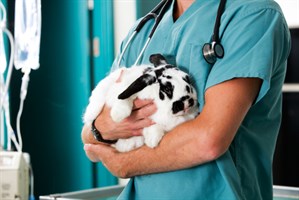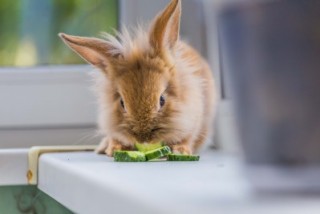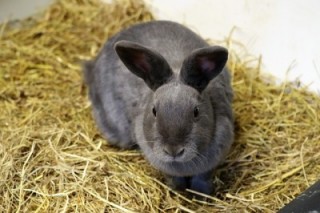We're here to help
Common rabbit diseases and other ailments
Our emergency and critical vets see thousands of rabbits every year. Here we’ve listed some of the most common rabbit ailments, rabbit illnesses and emergencies and some general advice on how to deal with them. You can always seek advice from nearest Vets Now emergency clinic or 24/7 hospital if it’s out of hours.
We also offer an online video consultation service to make professional veterinary advice more easily available. While the service is not suitable for life-threatening emergencies, our experienced vets are available to discuss any worries or concerns you might have about your rabbit. If your pet needs an in-person follow-up appointment at any vet practice, we will refund the online consultation fee, so you never pay twice.
1. Loss of appetite
Loss of appetite may happen gradually or suddenly and may be associated with abdominal pain or swelling, passing mucus instead of droppings, or increased salivation and dribbling and wet fur around the mouth. While loss of appetite is not a specific indicator of one disease, it may be serious as it can lead to lack of gut movements, also known as gut stasis. This, in turn, can result in the onset of shock due to bacterial poisons. Any rabbit that fails to eat for more than four to six hours should be seen by a vet.

2. Swellings
These may be due to abscesses – common around the head in particular – or tumours. In most cases, abscesses and tumours appear gradually over weeks. But you may only notice them when they reach a certain size. If you discover any unusual lumps or bumps on your rabbit you should contact your vet as soon as possible.
3. Loss of balance or head tilt
Head tilt is often caused by bacterial infections of the middle and inner ear or infections of the brain. Another common cause is the parasite Encephalitozoon cuniculi which is a significant cause of disease and can, occasionally, pass to humans especially if immunocompromised. Once a rabbit has E. cuniculi. it passes infectious spores in its urine. Transmission to another rabbit occurs by eating these spores in contaminated food and water. If your rabbit has been affected it may struggle to stand up and its head may circle continuously in one direction. Rabbits should be kept as quiet as possible with dimmed lighting to avoid self-injury occurring, and you should contact your vet as soon as possible.
4. Flystrike
Flystrike in rabbits is a devastating condition, which is particularly common during warm weather. It is caused by the Lucilia sericata, or green bottle fly which is attracted to damp fur soiled with urine or soft faeces.
Each fly can lay up to 200 eggs on the skin, usually at the rear end of an animal, which then hatch into maggots within hours. The maggots grow by feeding on the rabbit’s flesh and, collectively, they can get through a large area of skin frighteningly quickly. The rabbit’s bottom, tail, belly and back is usually worst affected.
During the summer months, our emergency clinics see a big increase in the number of cases of flystrike.
During warm weather you should check your rabbits bottom and belly for any signs of fly eggs twice daily. Contact your vet immediately who will be able to provide further advice on how to get rid of the eggs.

5. Breathing difficulties in rabbits
If you notice a discharge from your rabbit’s eyes and nose as well as noisy breathing, your rabbit breathing fast, or open-mouthed breathing, you should contact either your own vet or, out of hours, your nearest Vets Now pet emergency clinic immediately. These may indicate respiratory infections or heat stress, which can be serious.
6. Myxomatosis
Myxomatosis is a virus spread by biting insects including fleas and mosquitoes. It killed 99% of the UK’s rabbit population when it arrived in the country in 1953. It causes a gradual swelling of the area around the eyes, ears, anus and genitals and can be fatal. You should always get your rabbit vaccinated by your vet to prevent infection. But if you do see any of the signs mentioned, then you should see a vet immediately.
7. Rabbit viral hemorrhagic disease
RVHD is a virus spread between rabbits by direct and indirect contact such as contaminated feed. It attacks their internal organs and causes internal bleeding.
There are two strains of the disease – RVHD1 which has been in the UK since the 1980’s, and the more recently discovered RVHD2. Symptoms may include blood around the nose, mouth or bottom, lethargy, reduced appetite. In some cases there may be no warning signs and it may cause sudden death.
8. Paralysis of one or more limbs
Paralysis of one leg may be associated with a fracture, nerve damage or a dislocation. Paralysis of both hind legs is more likely to be associated with a spinal injury such as a fracture or dislocation. These sorts of injuries are common in rabbits. Any rabbit showing signs of paralysis should be seen immediately.

9. Ear mites
Ear mite infestation in rabbits is caused by the parasite Psoroptes cuniculiis. The main symptom is skin scales on the inner ear, which turn into larger, thicker crusted lesions with surrounding hair loss. Ear mites are generally not an emergency but if left untreated the lesions can become infected, which can cause loss of balance and hearing. If your rabbit has ear mites you may see itching around the ear, head and neck, head shaking and a thick beige fluid in the ear canal.
10. Holly, mistletoe and ivy poisoning
Believe it or not, rabbits aren’t indigenous to the UK. They were introduced by the aristocracy in the 12th Century for fur and meat. As a result many of our native plants aren’t good for them. One of the most common is ivy. All of the plant is toxic to rabbits although particularly the leaves and berries. If your rabbit has eaten ivy symptoms may show within hours or they could take up to three days to appear. Signs of ivy poisoning include lack of appetite, diarrhoea, abdominal tenderness, and colic, as well as muscle twitching, paralysis and convulsions. Holly and mistletoe can also be poisonous.

